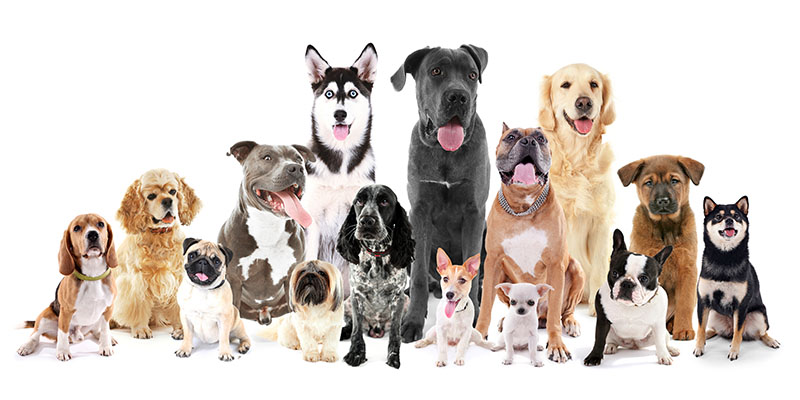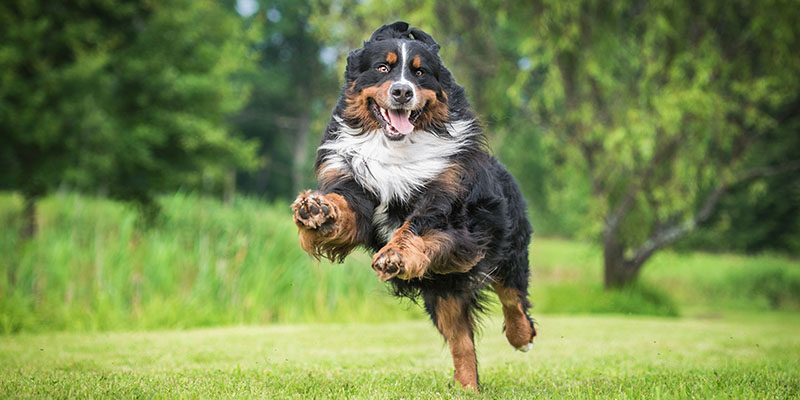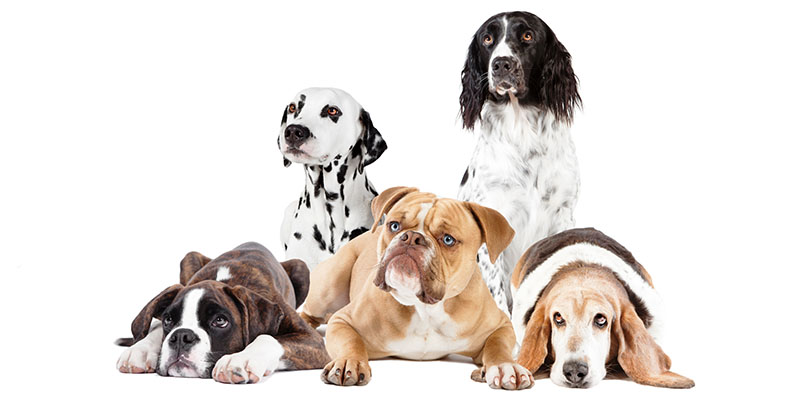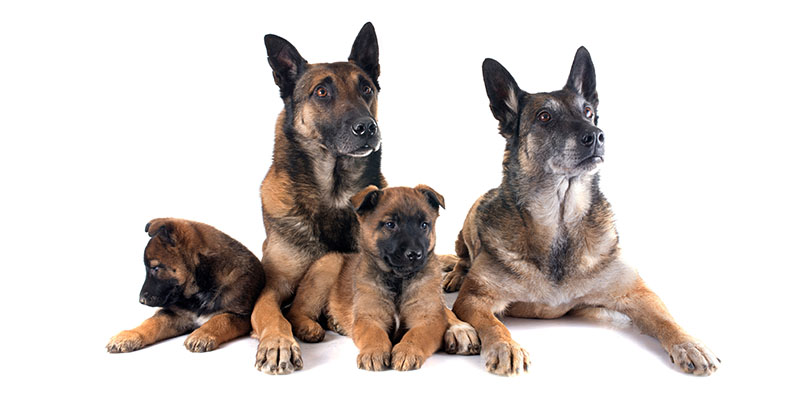
It can be really exciting adding a new family member to your household! Before you go home with the cutest rescue at the animal shelter, or purchase that bernedoodle with the luscious coat, it is really important to stop and consider the pup’s breed and how that would fit with your family. Choosing the right dog breed for you or your family can be both exciting and challenging.
In this blog:
When choosing the right dog for you, it’s important to research and learn about a breed’s typical temperament, energy level, and specific healthcare needs in order to find a good fit for your lifestyle and personality.
Over generations of selective breeding, characteristic personalities and temperament traits have become more common within specific breeds. While individual dogs within a breed can vary in temperament, generalizations about breed characteristics are grounded in observed dog behaviors over these generations of breeding.
For example, it is generally believed that these breeds have the following characteristics:
- Labrador Retrievers: typically outgoing, friendly, and good-natured making them great family pets and service dogs.
- Bulldogs: generally laid-back and gentle making them affectionate companions.
- Poodles: highly intelligent, often energetic, and trainable making them versatile and successful in various dog sports and activities, though may be more aloof and less interested in cuddling.
- German Shepherds: known for their loyalty, intelligence, and protective nature which makes them excellent guard and working dogs. This also can make them difficult to handle if they become afraid or wary of situations. Good consistent training is a must to keep them from developing anxiety around new people and situations.
- Border Collies: extremely intelligent, energetic, and determined which is why they are superb herding and agility dogs. They also require a high level of mental and physical stimulation. Not having this causes boredom, which can contribute to destructive behavior in the home.
- Great Pyrenees: Aloof, intelligent guard dogs. While they are loyal to their family, they are often better solitary dogs and may find other dogs as invading their turf.
- American Staffordshire Terrier: Loyal to their family, extremely loveable, often moderate energy and up for anything, and great couch cuddlers.
- Mixed dog breeds: generally exhibit a combination of personality traits of the breeds from which they have descended.
It is important to remember that individual dog personalities can vary within a breed due to variables such as genetics, early socialization, training, and life experiences.
So, regardless of a dog’s breed, you should always treat each dog as an individual and provide proper training, socialization, and care to foster a well-rounded and well-behaved companion. If concerning behaviors are noted at any point, early intervention with your veterinarian or trainer can help head off major concerns.
Questions to Ask When Choosing the Right Dog for You
What Sort of Home Do You Have?
This is the first question you should ask when selecting a dog breed. If you live in a small apartment, having a smaller dog is best. Corgis,, Papillons, Cavalier King Charles Spaniels, Shih Tzu’s, and many other small dog breeds do well in apartments.
Bigger dogs, like Labradors, Great Danes, Golden Retrievers, or high-energy small breed dogs like terriers, small border collies, or Australian Cattle Dogs, do better in larger living spaces with fenced-in yards.
Do You Live in a Rural or Urban Area?
Next, think about your location. Will your dog have access to large areas in which to freely roam around? Active dog breeds will thrive in available outdoor space.
While living in a rural area opens up more choices in choosing a dog, remember that with a rural area also come ticks and sticky plants. A breed with a shorter coat will minimize fur maintenance.
If you are a city dweller, research where dog parks are located and whether they have separate parks for small and large dogs.
How Big is Your Family?
If you are planning on expanding your family, or already have a large family, consider what breed of dog will fit best.
Small children tend to pull and play with dogs’ ears and coats, so you will want to get a family-friendly breed if you have a baby or toddlers. Golden Retrievers and Labradors tend to be great family pets.
Keep in mind that larger dogs often have a lot of energy. You will need time to keep them exercised. If other family demands would make it hard for you to walk or run your dog regularly, you might want a more mellow breed of dog.

What is Your Budget?
Before choosing a dog breed, it might be important for you to lay out a budget that includes your initial acquisition of your new family member, potential ongoing healthcare expenses, training, boarding, veterinary costs, and other needs.
Purebred dogs can be more expensive to purchase than mixed breeds. A good breeder will do extensive health and genetic testing on the male and female being bred, and often on the puppies (depending on the breed), in addition to choosing a sire and bitch with good personality and good looks. AKC registration and certification, along with the rarity of a breed also contribute to the cost of a purebred. If you’re interested in finding responsibly bred puppies in your area, you might consider the American Kennel Club Marketplace.
If you have your heart set on a purebred but want to save on the cost, you might consider adopting. You do run the risk of adopting a poorly bred dog this way, so it is important to set aside money to cover medical costs that may develop (examples listed below).
Breed-Specific Health Concerns
It’s wise to conduct research on potential health issues associated with the breed you are interested in. You’ll also want to work with reputable breeders who prioritize health testing.
Regular veterinary check-ups, preventive care, proper nutrition, and exercise can help manage healthcare costs and keep your dog healthier in the long term. Pet insurance can be a useful financial tool to help cover unexpected veterinary expenses, especially for breeds with a high frequency of chronic medical conditions (ie French Bulldogs). A great pet insurance comparative website is www.pawlicy.com. If you elect not to invest in pet insurance, make sure you have a plan to manage medical expenses as they arise.
Certain dog breeds can be prone to specific health issues which can lead to higher healthcare expenses. While it’s important to remember that individual dogs’ health can vary widely, these breeds have a higher likelihood of encountering breed-specific health problems, especially if poorly bred:
- English Bulldogs and French Bulldogs: Brachycephalic breeds, known for their flat faces, are prone to respiratory issues, which may require surgical treatment early in life to prevent life-threatening breathing issues from developing. They are also prone to obesity which can worsen their respiratory disease. A high percentage also develop allergies at a higher rate then other pets (especially any “blue” color varieties) and require frequent, chronic medical treatment throughout their life.
- Pugs: Another Brachycephalic breed prone to respiratory problems, dental disease, and skin conditions. They are also prone to eye diseases.
- Golden Retrievers: Often experience skin allergies and joint issues as well as a possible increased incidence in some cancers around middle age.
- German Shepherds: Can be prone to hip dysplasia and other joint problems, which may necessitate surgeries. Also prone to increased anxiety requiring good training and possible chronic medications.
- Dachshunds: Due to their elongated bodies, they are more susceptible to back problems and intervertebral disc disease (IVDD). Routine dental care is very important as they are prone to severe dental disease if left untended to throughout their life.
- Labrador Retrievers: Prone to obesity and certain joint issues. May have an increased incidence of allergies and ear infections.
- Cavalier King Charles Spaniels: Can suffer from heart conditions, particularly mitral valve disease.
- Great Danes: Susceptible to certain heart conditions, bloat, and joint issues.
- Chihuahuas: Prone to dental problems, patellar luxation (dislocated kneecap), and hypoglycemia.
- Mixed breed dogs: Generally considered to have less risk of chronic medical conditions due to them being less in-bred.
How Active Are You?
Are you an active person? Do you walk or run every day? If so, you might want to consider a breed that can run alongside you!
Many dog breeds have boundless amounts of energy and need to move many times a day. A house with a fenced-in backyard gives these active breeds the space and opportunity for movement they need. For some breeds, a backyard isn’t enough, and they need to be involved in some variety of sports to exercise their sharp minds as much as their body.
If you don’t live an active lifestyle, don’t worry! There are plenty of breeds that love lots of time cuddling on the couch. Even a number of larger dogs prefer snuggling up during a movie over playing fetch. For example, did you know that Greyhounds, although the fastest dog breed, tend to love lying around?
Active Dog Breeds
For physically active pet owners or owners with fenced-in yards, you may want to look into the following dog breeds:
- Retrievers
- Shelties
- Border Collies
- Russel Terriers
Less Active Dog Breeds
For dog owners who tend to live a less active lifestyle, these dog breeds might be the perfect match:
- Bulldog
- Basset Hound
- Pugs
- Shih Tzu
Laid-Back Dog Breeds
If you tend to be more of an introvert, these breeds like their own space and independence:
- Greyhounds
- Shiba Inu
- Cairn Terriers
How Often Do You Travel?
If you travel often and don’t plan on taking your pup on your trips, getting a breed that is not prone to anxiety while you are away is critical. Some breeds love the company of other dogs and will thrive in dog daycares while you are away; others may feel more stress when you are not present.
If you do plan on taking your furry friend with you when you travel, seek a breed whose size and weight fit airplane regulations.
More Factors to Consider When Choosing a Dog Breed

Size Considerations
A dog’s size may factor into your dog breed choice in more ways than one.
Are you envisioning a small dog that can cuddle into your lap? Or you may have your heart set on a large breed that can run through a field with you? Do you want a dog that can sleep at the end of your bed?
Note that smaller dogs can be more susceptible to cold and injuries. And it is possible that they may need to be taken outside for potty breaks more often than a larger breed.
Don’t be fooled on the issue of obedience. Just because a smaller breed might be easier to whisk away when they are misbehaving doesn’t mean they don’t need proper training. Many smaller breeds can be tiny but mighty! Many smaller breed dogs tend to be more stubborn and take longer to potty train.
Large dogs will need more space to move around, including “wagging space.” You don’t want their happy tails breaking your favorite household objects. Larger dogs also mean greater quantities of food.
Large dog breeds are more prone to leave a slobber trail, so keeping a slobber cloth on hand is a good idea. When they start shaking their head and drooling at the same time, it can sometimes feel like an active sprinkler!
Breed size is also important to keep in mind when you consider your own physical health. Holding back a 130-pound Pyrenees when he is interested in the next door neighbor’s dog, or lifting a 90-pound labrador out of the car when her arthritis makes it difficult for her to walk, both require a human caregiver that is fit.
Training Experience
If this is your first dog, you may want to look at a breed that has a lower risk of anxiety or aggression and will need less training to have good manners. This may include breeds like the Cavalier King Charles Spaniel, Shetland Sheepdog (sheltie), Standard Collie, Papillon, and Shih Tzu.
If you have had dogs before but aren’t quite up for a challenge, breeds that require some training but catch on quickly include the American Staffordshire Terrier, Pug, Dachshund, and Chihuahua.
If you are an experienced dog owner with the time to put into training and socializing your new pup and want a loyal best friend, breeds like the German Shepherd, Rottweiler, Great Dane, Shiba Inu, Border Collie, and Australian Shepherd.
In general, a rescue from a Pet Rescue organization should fall into the middle category as they have often been with a foster so you have an idea of their underlying behaviors. A rescue from the shelter may be better for those with some dog training experience as they can come with dog aggression, separation anxiety, fear of unknown people, or noise phobias.
Physical Maintenance and Grooming Costs
A dog’s physical appearance has a lot to do with its maintenance needs. While all dogs need basic grooming, some dogs require more frequent visits to the groomer than others due to their particular coat.
A dog with a longer coat that keeps growing will need regular visits to the groomer to avoid mats in their fur. Even smooth, short-haired dogs can be mega-shredders. Do you mind hair on your furniture or rugs?
Dogs with big floppy ears can be more prone to ear infections and require regular ear cleanings.
Small breed dogs may require their anal glands to be expressed routinely so they don’t become infected or impacted.

Age
Puppies require lots of time and attention. From training to doo-doo oopsies, make sure you have extra time for your pup for housebreaking and obedience training. Remember that patience is a must! Obedience training lasts at least through their second year of life.
Adult dogs can be an excellent choice if you do not have the time to train a puppy. However, this does not mean that every adult dog is already trained; you should expect some training during your first months with your new dog.
Senior dogs can make wonderful pets and can be a gift to a dog living out its golden years. Often overlooked in shelters, senior dogs can be loyal companions for those looking for a low-energy dog. However, you have to accept that having a senior dog may mean more vet visits as aging issues arise.

Breed
Purebreds tend to be a popular choice among many dog seekers because you may know exactly what type of coat, color, or kind of dog you are going to get. Thoroughly researching the purebred dog you are looking for helps you understand if the breed’s grooming requirements, health risks, and temperament are the right match for you.
Mixed dog breeds are also popular. Often, the combination of two breeds can balance out temperaments and behaviors that might be more intense in a purebred. Some experts believe mixed breeds tend to have fewer health issues than purebred dogs.
Remember that adopting a mixed breed, especially a puppy, means you can’t know exactly what their appearance will be when they grow up.
Adopting a mixed breed usually means you are saving that pup from shelter life or euthanasia, and that is a wonderful feeling that you will always carry with you!
Researching all the factors to consider when bringing a dog into your life can be both fun and at times a bit overwhelming. Consider talking to other dog owners, your vet, and family members. Read blogs on reputable websites like Harmony’s.
Taking the time to research what kind of dog best suits you and your lifestyle is the first step on your journey to adding a new family companion to your life.
At Harmony Animal Hospital in Apex, NC our passion for dogs comes through in everything we do. We are here to provide the best veterinary care for all breeds of dogs in our area, meeting your dog’s ongoing healthcare and dietary needs. Learn more about all our services on our website or contact us at: (919) 303-3456

